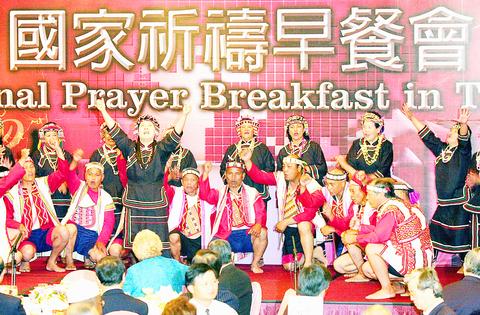President Chen Shui-bian (陳水扁) yesterday resolved to seek reconciliation both in cross-strait relations and among the country's political parties, saying that dialogue for reconciliation is the universal language for Taiwanese and people of the world.
Attending the nation's second National Prayer Breakfast with its theme of reconciliation, the president reiterated his wish to normalize relations with China and expressed his intention to hold a summit where leaders across party lines would be invited to exchange views on national affairs.
"Since I took office, I have been seeking a mutually beneficial relationship with China under the principles of reconciliation and cooperation, with an aim to eradicate animosity," Chen said.

PHOTO: GEORGE TSORNG, TAIPEI TIMES
"I am convinced that with patience, perseverance, wisdom and creativity, the leadership of the two nations will be able to open the door for reconciliation to attain eternal peace across the Strait."
Applying the same mindset to domestic politics, Chen urged leaders of all factions to forsake prejudice and antagonism and to work with him in the best interest of the people.
"As long as [we don't] harbor enmity in our hearts, there will be no foes in our eyes," he said.
"It is a norm in a democracy to have both partisan competition as well as cooperation. But rivalry between parties should sprout a nation's competitive advantage, not create antagonism and conflicts within a nation."
He told the audience he hoped both the ruling and opposition parties would learn to be more tolerant, "replacing speculation and opposition with sincerity and collaboration."
Chen also stressed he would do whatever it takes to make a summit meeting between parties a reality.
Leaders from different party lines would be invited to discuss subjects such as constitutional and governmental reform, as well as economic and cross-strait issues, he said.
Also at the breakfast, Chen said that the message of reconciliation is needed around the world.
"Reconciliation is not only the common hope for Taiwanese, but also the cornerstone of global security and peace.
Although Chen is not a Christian, he prayed that God would make him a peace-lover enabling him to join other peaceloving people in achieving world peace.
The religious ritual was first introduced in 1935 by Methodists participating in Bible studies. Some American politicians who were Christians adopted the custom four years later to pray for their nation.
Taiwan's annual prayer breakfast began last year and was initiated by the Reverend Kao Chun-ming (
Kao has said that he was deeply moved by the South Korean event and inspired to host a similar event in Taiwan.
Around 750 prominent figures from the public and private sector, including former president Lee Teng-hui (
Also in attendance were religious heavyweights, diplomats based in Taipei and some 130 lawmakers from the US, Germany, Canada, Japan, South Korea, Thailand and Kuwait.
Although PFP Chairman James Soong (

SECURITY: As China is ‘reshaping’ Hong Kong’s population, Taiwan must raise the eligibility threshold for applications from Hong Kongers, Chiu Chui-cheng said When Hong Kong and Macau citizens apply for residency in Taiwan, it would be under a new category that includes a “national security observation period,” Mainland Affairs Council (MAC) Minister Chiu Chui-cheng (邱垂正) said yesterday. President William Lai (賴清德) on March 13 announced 17 strategies to counter China’s aggression toward Taiwan, including incorporating national security considerations into the review process for residency applications from Hong Kong and Macau citizens. The situation in Hong Kong is constantly changing, Chiu said to media yesterday on the sidelines of the Taipei Technology Run hosted by the Taipei Neihu Technology Park Development Association. With

CARROT AND STICK: While unrelenting in its military threats, China attracted nearly 40,000 Taiwanese to over 400 business events last year Nearly 40,000 Taiwanese last year joined industry events in China, such as conferences and trade fairs, supported by the Chinese government, a study showed yesterday, as Beijing ramps up a charm offensive toward Taipei alongside military pressure. China has long taken a carrot-and-stick approach to Taiwan, threatening it with the prospect of military action while reaching out to those it believes are amenable to Beijing’s point of view. Taiwanese security officials are wary of what they see as Beijing’s influence campaigns to sway public opinion after Taipei and Beijing gradually resumed travel links halted by the COVID-19 pandemic, but the scale of

A US Marine Corps regiment equipped with Naval Strike Missiles (NSM) is set to participate in the upcoming Balikatan 25 exercise in the Luzon Strait, marking the system’s first-ever deployment in the Philippines. US and Philippine officials have separately confirmed that the Navy Marine Expeditionary Ship Interdiction System (NMESIS) — the mobile launch platform for the Naval Strike Missile — would take part in the joint exercise. The missiles are being deployed to “a strategic first island chain chokepoint” in the waters between Taiwan proper and the Philippines, US-based Naval News reported. “The Luzon Strait and Bashi Channel represent a critical access

Pope Francis is be laid to rest on Saturday after lying in state for three days in St Peter’s Basilica, where the faithful are expected to flock to pay their respects to history’s first Latin American pontiff. The cardinals met yesterday in the Vatican’s synod hall to chart the next steps before a conclave begins to choose Francis’ successor, as condolences poured in from around the world. According to current norms, the conclave must begin between May 5 and 10. The cardinals set the funeral for Saturday at 10am in St Peter’s Square, to be celebrated by the dean of the College